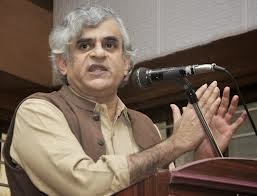Trivandrum: “Neo liberalism can only undermine democracy “says P Sai Nath, rural affairs editor of The Hindu in his keynote address given on the session ‘inclusion of the excluded’ on behalf of the International Conference on Deepening Democracy held at Samudra hotel, Kovalam. His talk was a brilliant exposition of the reality on the underground. He began the speech congratulating all the paper presenters. He opined that growing inequality is the greatest problem faced by our country. The word inclusion has entered the book of buzz words. He stands as a staunch proponent, advocate and supporter of decentralisation. Ours is a nation driven on the path of development. It is necessary to ponder over what has happened during the last twenty years. Millions have left their home. It is clearly depicted in the last census that the country has witnessed the mightiest migration. In 2011 census, number of people added to rural population is about 91 million. The urban rural growth differentiation is great in the last thirty years. As he is a rural editor, he spends most of the time in rural area with the people over there.
There have been massive job losses in the country. There is a decline of fourteen million jobs in the agricultural sector. There are millions of people entrusted in this who all are not farmers. He then started talking about Governments and states violating the constitution. Even the 73rd and 74th amendments also violate the constitution. He then mentioned about SEED that is going to be one of the lucrative industries in the country. Then he talked about the process of election that has become more important than the elected body. The process of election is more enabling and participative. We can see global power versus decentralised power .He quoted a famous line from the great Indian poet par excellence Rabindranath Tagore that “food is the source of great wealth and food production is the source of great misery”. Hunger and thirst are greatest threats in the world. He cited the paradox from 1990’s about the gutting of estates when the democratic powers were on the rise.
Water is already the biggest part of conflict in the world. He mentioned about the rivers like Mullaperiyar, Almatti and Kaveri which are creating certain disputes. He substantiated this problem of water quoting an example of a younger brother killing the elder one at the city of Karnul. Maratwada of Maharashtra was afflicted with the problem of drought. Now we can see twin towers coming up.In addition to this, there are private swimming pools in every floor. The marginal farmers who fled because of the drought are now indulged in the construction work. In the city of Osmanabad, we can see the sight of every vehicle carrying at least four pots of water. Then he expressed the fact on the city of Mehboobnagar in Andhra Pradesh that many of the dispossessed peasants from the place have migrated to work in BARC. Their joblessness prompted them to move towards BARC. He then stressed the key idea that neo liberalism cannot deepen democracy. It can decentralise the problem and centralise the power of solution. He said that in the National food security bill, there is no reference of the word farmer. He then expounded the condition of many eastern states especially Jharkhand. The education given there is of poor quality.
 He then made a suggestion that why can’t we make Directive principles
of state policy a bill of rights. The state shall endeavour to regulate
equality whether economic or social. Legislation itself is not
important. He concluded his speech with the statement that mass
movements and mass struggles are necessary.
He then made a suggestion that why can’t we make Directive principles
of state policy a bill of rights. The state shall endeavour to regulate
equality whether economic or social. Legislation itself is not
important. He concluded his speech with the statement that mass
movements and mass struggles are necessary.
No comments:
Post a Comment